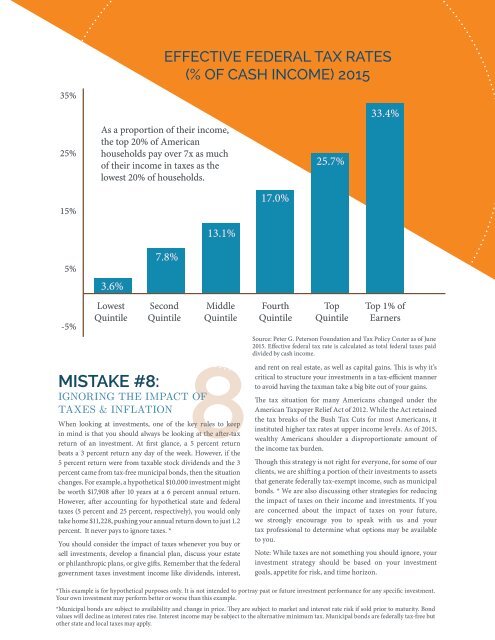9 Investment Pitfalls High Net-Worth Investors Should Avoid
There is a lot of uncertainty surrounding today’s financial markets. It’s important to stay informed. Stay on track by becoming aware of which investing mistakes to sidestep.
There is a lot of uncertainty surrounding today’s financial markets. It’s important to stay informed. Stay on track by becoming aware of which investing mistakes to sidestep.
Create successful ePaper yourself
Turn your PDF publications into a flip-book with our unique Google optimized e-Paper software.
35%<br />
25%<br />
15%<br />
EFFECTIVE FEDERAL TAX RATES<br />
(% OF CASH INCOME) 2015<br />
As a proportion of their income,<br />
the top 20% of American<br />
households pay over 7x as much<br />
of their income in taxes as the<br />
lowest 20% of households.<br />
17.0%<br />
25.7%<br />
33.4%<br />
5%<br />
-5%<br />
3.6%<br />
Lowest<br />
Quintile<br />
7.8%<br />
Second<br />
Quintile<br />
13.1%<br />
Middle<br />
Quintile<br />
8<br />
MISTAKE #8:<br />
IGNORING THE IMPACT OF<br />
TAXES & INFLATION<br />
When looking at investments, one of the key rules to keep<br />
in mind is that you should always be looking at the after-tax<br />
return of an investment. At first glance, a 5 percent return<br />
beats a 3 percent return any day of the week. However, if the<br />
5 percent return were from taxable stock dividends and the 3<br />
percent came from tax-free municipal bonds, then the situation<br />
changes. For example, a hypothetical $10,000 investment might<br />
be worth $17,908 after 10 years at a 6 percent annual return.<br />
However, after accounting for hypothetical state and federal<br />
taxes (5 percent and 25 percent, respectively), you would only<br />
take home $11,228, pushing your annual return down to just 1.2<br />
percent. It never pays to ignore taxes. *<br />
You should consider the impact of taxes whenever you buy or<br />
sell investments, develop a financial plan, discuss your estate<br />
or philanthropic plans, or give gifts. Remember that the federal<br />
government taxes investment income like dividends, interest,<br />
Fourth<br />
Quintile<br />
Top<br />
Quintile<br />
Top 1% of<br />
Earners<br />
Source: Peter G. Peterson Foundation and Tax Policy Center as of June<br />
2015. Effective federal tax rate is calculated as total federal taxes paid<br />
divided by cash income.<br />
and rent on real estate, as well as capital gains. This is why it’s<br />
critical to structure your investments in a tax-efficient manner<br />
to avoid having the taxman take a big bite out of your gains.<br />
The tax situation for many Americans changed under the<br />
American Taxpayer Relief Act of 2012. While the Act retained<br />
the tax breaks of the Bush Tax Cuts for most Americans, it<br />
instituted higher tax rates at upper income levels. As of 2015,<br />
wealthy Americans shoulder a disproportionate amount of<br />
the income tax burden.<br />
Though this strategy is not right for everyone, for some of our<br />
clients, we are shifting a portion of their investments to assets<br />
that generate federally tax-exempt income, such as municipal<br />
bonds. * We are also discussing other strategies for reducing<br />
the impact of taxes on their income and investments. If you<br />
are concerned about the impact of taxes on your future,<br />
we strongly encourage you to speak with us and your<br />
tax professional to determine what options may be available<br />
to you.<br />
Note: While taxes are not something you should ignore, your<br />
investment strategy should be based on your investment<br />
goals, appetite for risk, and time horizon.<br />
*This example is for hypothetical purposes only. It is not intended to portray past or future investment performance for any specific investment.<br />
Your own investment may perform better or worse than this example.<br />
*Municipal bonds are subject to availability and change in price. They are subject to market and interest rate risk if sold prior to maturity. Bond<br />
values will decline as interest rates rise. Interest income may be subject to the alternative minimum tax. Municipal bonds are federally tax-free but<br />
other state and local taxes may apply.


















